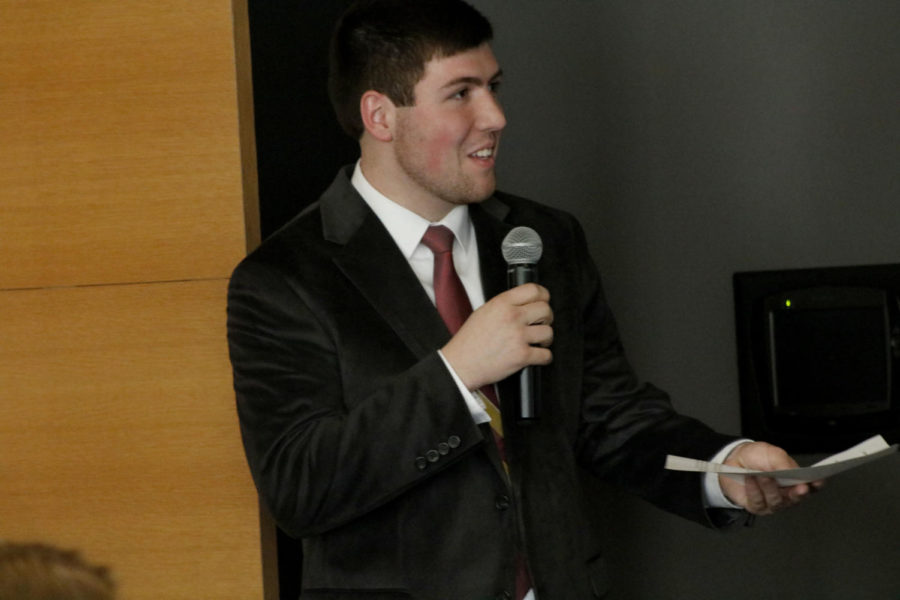Education, reflection serve as main points of discussion for final West-Smith town hall of year
Jackie Norman/Iowa State Daily
Student Body President Cody West speaks during the Student Government town hall meeting in the Soults Family Visitor Center on March 22. During the meeting, West spoke of achievements from his presidency that he is most proud of.
March 22, 2018
Supporting an increase for counseling services on campus was what came to mind for Cody West when asked what one of his proudest moments was during his time as Student Government president.
For Cody Smith, vice president, he reflected on Student Government’s work in addressing issues surrounding off-campus residency, as well as the creation of a residential rating system for students and property managers. This, he felt, was what made him the proudest.
On Thursday, March 22, West and Smith hosted the last town hall of their administration. While questions were geared toward campus climate, enrollment and student health; the town hall also served as a time for reflection on the past year as well as what’s next for Student Government.
The town hall was hosted in coordination with students affairs and panelists included Erin Baldwin, interim assistant vice president for student health services; Laura Doering, associate vice president for enrollment management and student success; Margo Foreman, director of the Office of Equal Opportunity; Cody Smith, vice president of Student Government and Luis Rico-Gutierrez, dean of the College of Design.
About 25 people were in attendance of the event, many being senior administrators and other Student Government officials.
One of the questions asked by Dean of Students Vernon Hurte, who assisted in moderating the town hall, was on the proposed cuts to the Iowa Board of Regents by the legislature — $10.9 million to be absorbed by Iowa State and the University of Iowa.
Doering said that from her perspective as the vice president of enrollment management and student success, and when considering not just the cuts but also the continued growth in students at Iowa State, major concerns are raised about the quality and affordability of education.
Rico-Gutierrez spoke to a similar vein, adding that the quality of an education should remain above all.
“The one knob that I don’t want to touch in the negative direction is quality, at least that is my job as a dean,” he said. “And if I want to move that knob it is always going to go [toward] improving the academic experience.”
To ensure state funding, students such as Smith and others in Student Government openly advocate for the necessity of state dollars when it comes to higher education budgets.
This year, Smith said, Student Government worked to make the issue of lagging state appropriations “personal” to the Iowa Legislature.
The administrators highlighted that through student advocacy, such as lobbying at the statehouse, Student Government helps enact real change and can make a difference — both on and of campus.
“You’re really important in the process of making decisions of how we’re going to implement or make changes to be more efficient,” Rico-Gutierrez said.
The town hall also focused on campus climate, with an opportunity for West and Smith to reflect on their time as Student Government leaders. A broader question Smith asked those on the panel, however, being: “Where could Student Government go and what can we do to help whatever it is you [administrators] are involved in?”
Doering encouraged students to join committees or serve on project teams, specifically mentioning the work her office hopes to do in closing the achievement gap at Iowa State.
“As new student leaders, I want to hear from you,” she said.
In regard to culture, Student Government President-elect Julian Neely asked the panel what they feel the culture is at Iowa State.
While responses varied, there was a general consensus that it is important to bring different identities together to engage with each other in order to improve community, as well as build upon diversity and inclusion.
“If I were to talk about culture in general and how we look at things, I think we’re moving from a place where we’re at ‘good enough’ and we’re moving from a place where we’re at whatever that ‘Iowa nice’ is [either] by force or our decision to just leap into it,” Foreman said.
The panel concluded after nearly an hour and a half.
















